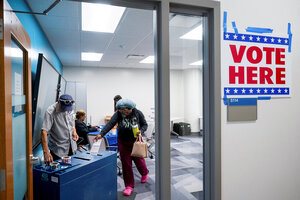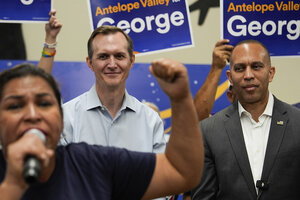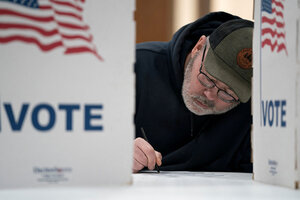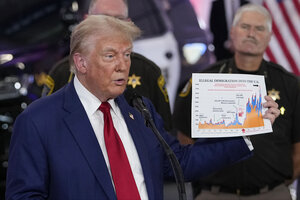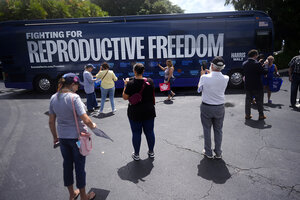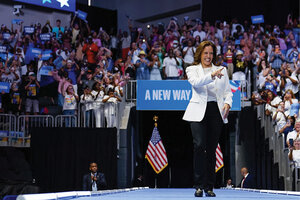200 miles from where Trump was shot, ordinary citizens combat political violence
Loading...
| CHAMBERSBURG AND GETTYSBURG, Pa.
For the past year, reporter Simon Montlake has been following efforts in a Pennsylvania community to reduce political violence. The federally funded program brings a diverse set of community members together to grapple with polarization, misinformation, and distrust.
Just before publication, a gunman in this state attempted to assassinate former President Donald Trump, underscoring the importance of such work in our common lives together.
Inside a studio for News Talk 103.7 FM in Chambersburg, Pennsylvania, Michele Jansen is swiveling her chair at a mottled cream desk as the morning sun brightens the storefront window behind her.
Why We Wrote This
A story focused onBefore the attempt on former President Donald Trump’s life, there had been rising incidents of harassment and threats of violence against public officials. Can America dim the specter of political violence?
It’s just turned 8 a.m., and Ms. Jansen has been on air for two hours with her co-host, Pat Ryan, the station director who keeps above his desk a salvaged road sign reading “Keep Right.” Their show, “First News With Pat & Michele,” takes the morning slot at this conservative talk radio station.
In the aftermath of the 2020 election, their show had a fierce edge. It helped amplify unproven and false claims of election fraud that led up to the Jan. 6, 2021, attack on the U.S. Capitol by devotees of defeated President Donald Trump. These included a sizable contingent from Pennsylvania.
But since then, Ms. Jansen has been working to change her tenor and tone and find a way to be a “Pennsylvania uniter” – even while maintaining decidedly conservative positions. This morning the “First News” hosts are discussing the Biden administration’s plan to remove cannabis from its current Schedule I status, a government label that marks it as one of the most dangerous drugs.
Ms. Jansen is debating one of their guests, state Rep. Paul Schemel, a Republican who is unperturbed by the plan. He points out how cannabis is already medically prescribed in Pennsylvania. But the co-host pushes back, pointing out that the long-term effects of high-potency cannabis haven’t been properly studied.
“It seems to me they’re just ignoring that, Paul,” she tells the lawmaker, ticking off the risks of easing restrictions on the plant. Why is the White House eager to reschedule now? she asks. “I think they’re thinking of voters. I have to be honest.”
Coming from Ms. Jansen, it’s a relatively mild critique of the Democratic president. A medical researcher before making a midlife pivot to political advocacy and then to her perch in conservative talk radio, Ms. Jansen had been a lot more aggressive just a few years ago.
After the Jan. 6 assault on the Capitol, Ms. Jansen found herself ostracized in local Facebook groups. Some users called for a boycott of her station. She was stung by what she calls the “dehumanizing language” used by all sides. Even worse, the political vitriol was spilling over into everyday civility. “We have groups of people who are so cruel to each other on social media in this town,” she says.
She and others became concerned about rising incidents of political violence, as well as the escalating harassment of public officials, including violent threats. Over 80% of local officials said they had experienced incidents of such harassment in a recent survey by the National League of Cities.
So the conservative talk show host decided to do something different. Last year she volunteered to be a coordinator for an initiative funded by the Department of Homeland Security called Uniting To Prevent Targeted Violence. The funding doles out $20 million in grants annually for violence prevention and counterterrorism, including to local nonprofits and other organizations trying to find ways to prevent political violence before it germinates within local communities.
Ms. Jansen began working with the nonprofit Urban Rural Action, which received a federal grant. She helped recruit volunteers in Franklin County, trying to build a team as politically and culturally diverse as possible. Its aim was to develop projects that would build social cohesion amid the United States’ current discord.
The thinkers behind these violence prevention efforts adopt a public-health approach, addressing violence in the way health experts would urge better nutrition and exercise, for example. The long-term goal, experts say, is to safeguard communities against violence and drain the pool of potential perpetrators.
“Political hostility and animosity contributes to a climate of fear and violence,” says Joe Bubman, founder and executive director of Urban Rural Action, who cut his teeth working on violence reduction in conflicts in Africa and Asia. Now he applies these skill sets closer to home.
The Monitor has been following several volunteer uniters in the Homeland Security Department-funded initiative in Pennsylvania for the past year. What happens when diverse members of a community try to tackle the drivers of division?
It isn’t an easy path. Some collaborations proved more fruitful than others. This is a story about everyday Americans grappling with polarization, anomie, and distrust, a story of hopes, fears, and a determination to discover what it means to build peace in a democracy under stress.
Bravery in the face of conflict
Chambersburg, like many towns in rural America, is a blue-tinged atoll in a sea of red. It’s part of Franklin County, which hasn’t voted for a Democratic president since 1964. Adams County, its neighbor, has the same voting pattern. Its county seat, Gettysburg, which elected a Black woman as mayor in 2021, is a liberal college town hemmed in by famous Civil War battle sites.
The area’s demographics are changing, however, particularly in Franklin County. Along the interstate corridor that runs through it, farms are converted to warehouses as new people move in and fill new jobs, sending their children to local schools.
“Transplants and those that grew up here, sometimes they are two different worlds,” says Mike Sanders, senior pastor at the Open Door Church in Chambersburg.
Like Ms. Jansen, Chad Collie is a paid coordinator for Urban Rural Action’s participation in the federal initiative to prevent targeted violence. Born in Kentucky, he moved to the area two decades ago after he met his Pennsylvania-born wife.
Troubled by the character of Donald Trump, Mr. Collie resigned from the GOP county board in 2016. He leans right on most issues, he says. But working as a contractor on historic homes in Gettysburg puts him at the kitchen table with plenty of Democrats who see the world differently.
“We’re putting together a group of people who would normally not talk to one another,” Mr. Collie says.
In April 2023, he drove to Harrisburg for a weekend meeting at a community college where his team and others would be brainstorming their collective projects.
It was a cool, cloudy morning, and thunderheads were gathering overhead. The Adams County team perched on blue sofas in a fluorescent-lit corridor, near two giant chess and Connect 4 sets. Mr. Collie asks what issues the group should be tackling, and what would be a way to effect change.
Tom Cassara, a college student who is the youngest volunteer, says misinformation about the Civil War stokes political division. Others chime in to suggest that civics education could help. Then, talk turns to who would be receptive to such programs. “You want to influence people who have influence,” says Mr. Collie.
Mr. Bubman, who is listening from the side, interjects. “Don’t get ahead of your audience,” he tells the group. “Focus on the community’s most urgent problem and what resources are available to address it.” Before he worked on international peace-building, the nonprofit’s founder worked on conflict management with U.S. corporations.
But as he designed his proposal to get a grant from the targeted violence initiative, he drew mostly on his work in countries like Kenya and Myanmar, where he served as the director of Mercy Corps’ Peace and Conflict team. In 2016, he saw similar warning signs of social fragility in the United States.
He wasn’t the only American steeped in conflict resolution abroad to feel this. In fact, others have begun to approach domestic political extremism using tools that were developed by international aid agencies.
“We see how it can get much worse,” says a peace-builder who asked not to be named because of the sensitivity of her work. “There’s nothing about the U.S. that makes us uniquely immune to large-scale violence.”
Adams County stood on such a precipice in 2020. Amid nationwide protests over the murder of George Floyd, armed groups of men showed up in droves on Gettysburg’s battlefields on the Fourth of July. An online hoax claimed that antifa would burn flags and desecrate Confederate statues, which prompted a number of these groups to mobilize.
Tensions rose locally, and they would remain heated for months to come, as protests flared within Gettysburg’s town square nearly every week, pitting Black Lives Matter protesters against right-wing counterprotesters as the 2020 election approached.
Many of the militiamen who roamed the battlefields on the Fourth were outsiders, however. They were drawn not only by the rumor of antifa aggression, but also by the national symbolism of Gettysburg. “We’re a magnet,” says Mr. Collie, who recalls when the Ku Klux Klan came to town.
Patti Robinson, a family mediator in Gettysburg, is the community partner for Mr. Collie’s team. In 2021, she worked as a peacemaker during a protest against a Confederate monument on a nearby battlefield. A group of counterprotesters, many of whom were armed and clad in combat gear, stood against them.
Ms. Robinson and a colleague, who wore bright-green vests labeled “Trust Network Mediator,” introduced themselves to both groups, letting them know their role. Then they stood between them, though at a distance, and kept watch. When confrontations got heated, they’d step in and try to de-escalate the situation. Emotions ran high; speeches ran long. But in the end, they helped keep the peace – there were no violent incidents that day. Some protesters thanked her for being there. “Everyone just wants to be heard,” Ms. Robinson says.
Her role that day, she later wrote, was to “practice bravery in the face of conflict. We don’t take sides. ... We want everyone to win.”
Honest, respectful dialogue, even with an edge
Classic R&B is playing at Lance Walker’s barber shop, a home business the former bodybuilder runs in the tiled basement of his modest ranch-style house here in Chambersburg.
Mr. Walker, who is Black, grew up in public housing outside Pittsburgh. After he joined the Army, he learned how to buzz-cut the hair of white soldiers while off-duty. He already knew how Black folk liked their hair.
Today his clientele is mostly white, of all ages and backgrounds.
The barber shop is a public square, a free-speech zone, says Mr. Walker. The hotter the topic the better, he says, so long as the heated dialogue remains civil. “Just pull the pin and roll the grenade,” he jokes.
On a recent Friday, Mr. Walker is running a comb through the hair of Mark Miller, a thrift store employee. He asks how short he wants it. Soon the two men are discussing public transit and housing policy. “I come here for the conversation as much as the haircut,” Mr. Miller says.
Ms. Jansen, the conservative radio host, recruited the work-from-home barber, asking him to join the effort to build social cohesion and help prevent targeted political violence. Mr. Walker wanted in.
Other members of the Franklin County team include Allison Stephens, a history teacher at Mercersburg Academy, a private boarding school that she calls “a little blue dot” in town.
Ms. Stephens leans left politically, and this puts her in the minority on the team. (Since it was formed, two team members ran unsuccessful campaigns for elected office, both as Republicans.) Another member, Doug Dobbs, is a retired historian and Civil War reenactor.
Other Urban Rural Action teams in Pennsylvania work with suicide prevention organizations, veterans outreach, and other kinds of social services. But the Franklin County team had a number of setbacks.
Team members wanted to prioritize outreach to people facing personal crises – like those who don’t know how to access public services like housing assistance, a lack of knowledge that can potentially drive some people to radicalize.
But both of the nonprofits they tried to work with backed out of their proposed projects for various reasons. Ms. Jansen felt frustrated, even though she was encouraged by their meetings with local law enforcement about how to assess potential threats of violence.
Despite the team’s setbacks, Mr. Bubman says the collaborative process brings its own rewards. “If you’re working together to achieve something, even if it’s modest, you’re building trust,” he says.
One example is the relationship between Ms. Jansen and the sharp-tongued, bald-pated barber, Mr. Walker, who are often miles apart when it comes to politics.
For Mr. Walker, trust begins with honest, respectful dialogue, even with an edge. From the start, he made a point of steering team talks to topics that raised the temperature in the room, including systemic racism and the personal slights he and his family experience while living in a majority-white community.
His own politics have shifted left. Because of his opposition to abortion rights, he wouldn’t vote for Barack Obama. In 2016, he voted for Donald Trump – though he came to regret it. By 2020, however, he got involved in racial justice campaigns. That year he also became the town of Chambersburg’s first nonwhite school board member. He locked horns with his colleagues almost immediately as he brought up the lack of diversity among the school system’s leadership and its teachers.
Mr. Walker remains a registered Republican, and he votes in GOP primaries. But he chafes at party labels. “I’m so sick of being put in a box,” he says.
He’s clashed with Ms. Jansen, too. In 2021, Chambersburg passed an antidiscrimination ordinance that Ms. Jansen opposed. She said it created special protections for certain groups and not for others. Four months later, Republicans on the Town Council repealed the ordinance, to the frustration of Mr. Walker, who had supported it.
Ms. Jansen is critical of diversity, equity, and inclusion policies in government. Mr. Walker served as a diversity adviser to Franklin County’s then-District Attorney Matt Fogal, a Republican who quit the party in 2020. He later condemned the Jan. 6 insurrection at the Capitol as “treasonous violence incited by the President of the United States.”
But Ms. Jansen and Mr. Walker both say their collaboration has built a protective layer of mutual trust that didn’t exist before. “We’ve built a bond within our group,” says Mr. Walker.
That bond was tested last December when Ms. Jansen announced she would be working for state Sen. Doug Mastriano, an outspoken hard-line Republican who was the party’s nominee for governor in 2022. His office is right next to the News Talk 103.7 FM studio, in fact, and it shares the same storefront entrance.
Had she joined Senator Mastriano’s staff earlier, before the group had jelled, it might have been a deal-breaker, given the senator’s politics, she says. But everyone took the news in stride, including Mr. Walker.
“What I love about our group is that we’ve stopped looking at each other as our enemy,” Ms. Jansen says.
Building a healthy, resilient community
When the conservative radio host began recruiting volunteers for Urban Rural Action, however, there was pushback within her social circles.
For many of them, any initiative by the Biden administration’s Department of Homeland Security to “prevent targeted violence” would be a weapon wielded against conservatives. Others asked her if progressives would be in charge, making it a total waste of their time. She tried to convince them otherwise.
Many worried, too, that federal law enforcement’s focus on white supremacist and anti-government extremists – whom the FBI considers the nation’s greatest domestic security threat – is just cover for an attack on conservative ideology.
Targeted violence covers a range of offenses, from school and workplace shootings to attacks on power stations and abortion clinics, as well as other politically motivated violence. Grassroots prevention efforts can both reduce the risk of violence and provide off-ramps for individuals drawn to extremism, say experts working on terrorism prevention.
“Ideally, nobody will be an extremist once you build a healthy, resilient community,” says Jordan Reimer, a project manager at the Institute for Strategic Dialogue, a think tank in Washington.
Half of all individuals involved in mass killings were motivated by a personal or workplace grievance, found a 2018 study by the Secret Service’s National Threat Assessment Center. Most of these had experienced major stress in the past five years, and over half were in financial trouble.
Violent extremists offer a sense of purpose and engaged community to such people, says Mr. Reimer, a former intelligence analyst at the New York Police Department. “It gives them an understanding of the world that makes sense to them.”
At the same time, nearly a quarter of Americans say violence may be necessary to achieve political goals, a Public Religion Research Institute study found. The proportion is even higher among Republicans.
That could be just gut-level talk. But some will be “vulnerable to an extremist coming along and saying, ‘Now’s the time. Now’s the time you need to move to violence,’” says Elizabeth Neumann, a former assistant secretary for counterterrorism and threat prevention at the Department of Homeland Security.
The current funding level at $20 million a year in local grants, however, is too small to be effective, Ms. Neumann says. That’s just a fraction of what countries such as Germany and Australia spend to combat extremism, and just a minuscule amount of total U.S. spending on domestic security. “We’re not even close to actually testing whether this could have a measurable effect on reducing violence,” she says.
Question starters for thorny topics
Last summer, the Adams County team landed on a project that would focus on community mediation practices. They developed a set of cards to be used as conversation starters for thorny topics, and planned to hand them out at “talk tents” at various community events. The project included color-coded pinwheels to add a random element to conversation topics. People could take cards home and use them to engage family and friends in conversations.
Card 1: What’s one thing you wish you could change about the world?
The cards are aimed at adults and teenagers, including high schoolers served by Betsy Hower, a volunteer and retired schoolteacher who continues working as a substitute. Ms. Hower loved the project. But she objected strongly when the group wanted to print cards in English and Spanish. No, she said. We’re not doing that.
Card 2: Why is it hard for people to talk about politics?
Ms. Hower, a former GOP county chair, also dismissed a proposal by Maria Banks, another volunteer, for pinwheels that listed microaggressions. Ms. Banks, who is Black, says she was stung by Ms. Hower’s refusals – as well as by the divisions they opened in the group. Eventually, a compromise was reached to print a separate set of cards in Spanish.
Card 3: When discussing politics, what are your “nonnegotiable” issues?
Mr. Collie, the contractor who was also a Republican member of the county board, says his group worked through its disagreements and didn’t give up. Even when tempers frayed, they all wanted to produce something tangible in their community that could outlast their program. “It’s been hard,” Mr. Collie admits. “That’s who we are: We’re all very passionate about particular things.”
Ms. Hower teaches Hispanic students who may prefer cards in Spanish, she says. But that isn’t a reason to print bilingual cards that would be a distraction for the majority who don’t. “This is America. You should speak English,” she says.
Card 4: What are the biggest issues in Adams County that divide our community?
In May, the Adams County team presented its talk tents at a program meeting at Gettysburg College. It was another rainy day outside on the campus, which had served as a field hospital in 1863 for Union and Confederate soldiers during the battle that became a turning point in the Civil War.
Inside, Ms. Jansen sat at a conference table with Mr. Walker and other Franklin County members, looking over the cards. “No one has respectful dialogue anymore,” Ms. Jansen says. “It’s red versus blue. It’s left versus right. It’s woke versus traditional.”
Still, if constructive dialogue offers a way to reduce polarization and potentially tamp down extremism, the question is, Whom can these efforts reach? Bridge-building initiatives usually attract political moderates like Mr. Collie and Mr. Walker, not hard-liners who are contemptuous of compromise and rhetorically endorse violence.
But the federally funded program isn’t designed to bring these people to the table, advocates say. The strength of building a diverse group of volunteers is its network and the credibility it brings to its projects, says Mr. Bubman. And by raising awareness of targeted violence and its risk factors, it also spreads the message that prevention is possible.
Mr. Cassara, the college student in the Adams County team, volunteered after seeing relatives embrace QAnon, the far-right conspiracy that labels Democrats satanic child abusers. Ideally, he says, talk tents would be a forum for engaging people “in the deep end” and offering a path out. But he also knows how hard it is to counter conspiracy theories within his own family.
“I’ve not been able to pull them out, but my relationships with them have gotten better,” he says of his relatives. “We can conduct these initiatives and we can try, but that’s all we can do. We can’t make people like that show up.”














